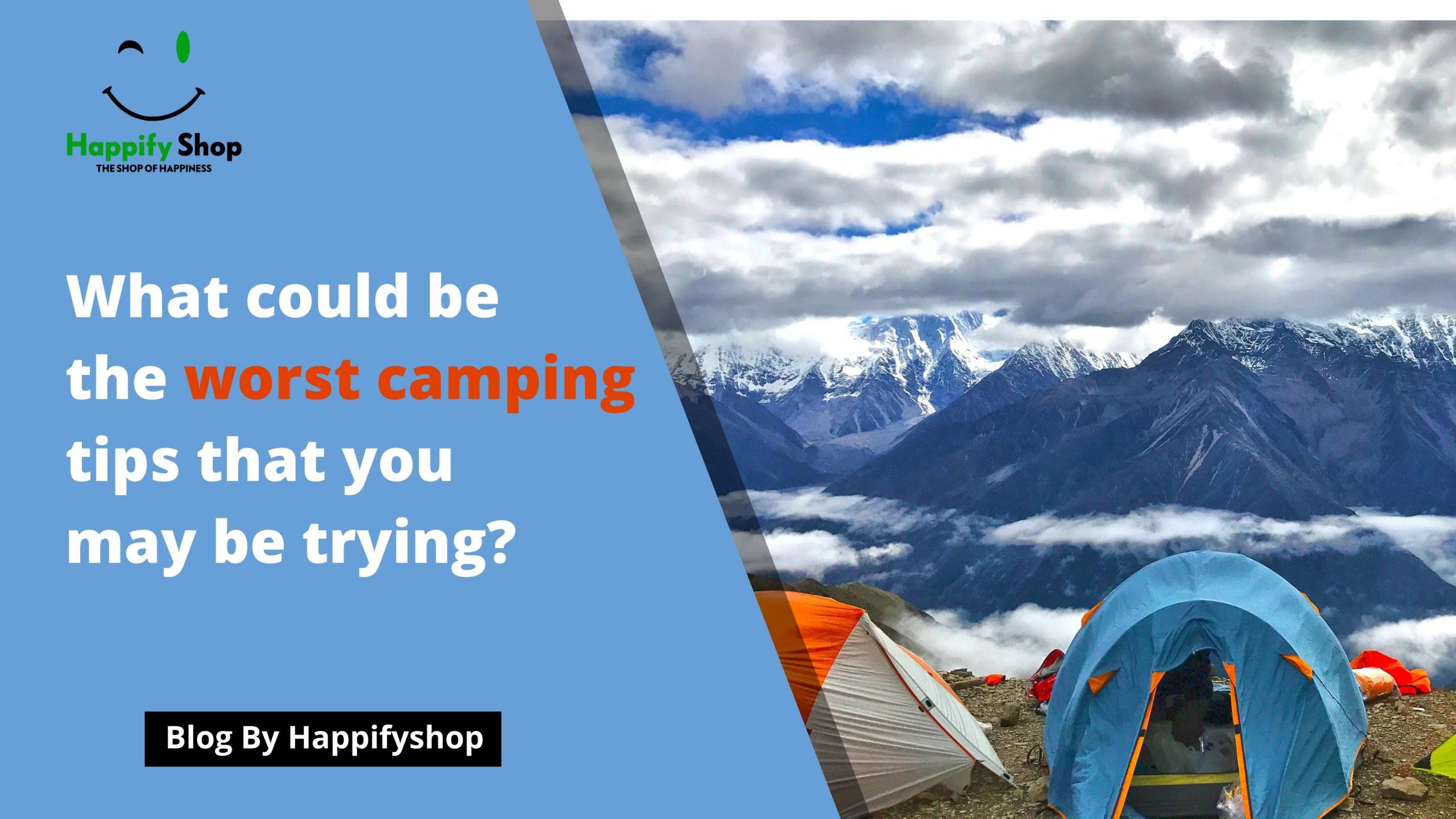What Could Be Worst Camping Tips That You May Be Trying?
Not every tip that you see on the internet is worth trying, and some of them could turn out as the worst camping tips. Read to know how to avoid them
The wonderful outside!
What’s not to love about a campfire’s comforting aroma, a starry night, a roasted dinner, toasted marshmallows, and spending time in nature? Well, this can be achieved via Camping. It provides an opportunity to escape the worries of daily life and burrow all of your troubles deep within the natural world making it one of the most incredible activities in the world.
However, before beginning this beautiful journey, you should be informed of the finest and worst travel recommendations. Most campers think all they need for the trip is essential equipment and a basic understanding of the area. Being in nature may expose you to starting a new venture that could produce complications for anyone.
Let’s Find out the Worst Camping Tips and How to Avoid them:
There are some general camping tips are listed below, along with some advice on ensuring your trip is enjoyable and well-planned.
Don’t Just rely on the weather forecast:
The various weather zones in the area must be considered whenever you decide to go camping. Due to the fluctuating nature of the weather, it may occasionally rain and occasionally be sunny. You shouldn’t entirely rely on long-range forecasts.
Sometimes, despite what a weather app or Google says, it may rain when it is supposed to be sunny. Pack sun and rain protection for yourself and your camping equipment before leaving on your vacation.
Always anticipate the worst while hoping for the best. Find out the weather there at all times of day by doing some research, and be ready for everything.
2. Pack the tent that you need:
When you go camping, tents are used to protect you and your belongings from the weather. To merely keep a tent for necessities on you is pretty silly. You must bring an exceptionally cozy tent to be used when camping.
Before heading to the campground, inspect the zippers, poles, and fabric, ensuring your tent can withstand weather conditions. Because no one would want to travel for a while only to arrive at your destination with a damaged tent.
When planning a camping trip with a group larger than three or four people or with friends or family, you cannot just rely on one type of tent. No one wants to ruin the vacation by having anything negative happen, especially if it involves resting and keeping the gear safe. Ensure that you have a tent in addition to the one you need.
3. Keeping the wrong clothes:
Walking about your composite in your bare feet is not a wise decision. To prevent harm, cover your entire foot with shoes, stay away from insects, and steer clear of dangerous plants. Bring some sandals and possibly some sneakers with you on your camping trip, but leave the fancy shoes at home.
Always dress in layers and be ready to get a little messy. You don’t need a lot of garments, but you need the correct kinds of clothing to keep you dry and warm. Be aware of the weather and prepare your bag accordingly.
4. Sleeping under the bear Sky:
Ohhh! Wow, that weather is fantastic. Let’s enjoy the nighttime sky. Looking at the weather while having a night beneath a clear sky seems extremely pleasant. Even though it appears like the ideal option, you might regret it.
Outside, pests like insects, animals, and worms are constantly present. You run the chance of getting bitten by insects, attacked by animals, covered in bird droppings, and other problems if you sleep outside without protection.
If you don’t have support, lying outside without a tent can harm your back. Taking a cushion, cot, or hammock is essential to elevate your body off the ground. Along with preventing discomfort, it also prevents the loss of body heat that occurs when the soil becomes chilly.
5. Taking Less Food:
Food is fuel for you. While camping, it is necessary to have enough food that gives good energy. It isn’t genius to say that not much food is required. Most individuals prefer to bring canned foods with them since they don’t realize how crucial it is to eat healthily while camping outdoors.
Fresh foods such as apples, bananas, grapes, tomatoes, cucumbers, and spinach should be included on your camping grocery list, along with canned baked beans and corn, whole wheat bread, peanut butter, and jam. Vegetable milk, plain yogurt, fresh chicken eggs, juices, beer, and numerous bottles of water should also be on the list.
It’s not a good idea to rely primarily on these foods because they are high in sugar, sodium, and preservatives. So a wise option is to include different food, such as fruits and vegetables. Also, always bring extra food with you at all times in case of emergency.
6. Starting campfires with gasoline:
While camping, cooking meals and a barbecue outside is fun in and of itself. The common belief is that gasoline can spark a fire. But in reality, it’s the worst idea imaginable! If you’re having trouble starting your fire, look for dry materials instead of a can of gasoline!
Gas, lighter fluid, and kerosene are all exceedingly risky fire starters to use in a camp setting. Your friends and family are at risk since the effects might be unpredictable, and combustible gases can catch fire far from your fire.
Insufficient ventilation can cause deadly carbon monoxide to be released from stoves and lamps. Even in well-ventilated areas, a malfunctioning appliance might release carbon monoxide.
7. Not Taking a Compass for finding destinations:
Today’s hikers and backpackers may not believe they need a compass. The location information provided by phones and other GPS devices is frequently significantly more accurate than that provided by a conventional compass. But these gadgets can also lose their signal or run out of battery. They might not give you a precise position or heading reading which happens in most of the scenarios.
Compasses are typically small, light, and affordable. It works without signal and has no battery issues. Poeple might consider it as “just in case” thing, but having it is always a good idea.
Never believe whatever your friends or family tell you at face value. Never go out on your own, even if you think you know the area well. It’s never a good idea to be left alone in case of an accident because the terrain can change depending on the weather.
Wrapping it Up:
Make an appropriate trip plan before going camping. It’s wise to consider all possible good and bad outcomes. If you only consider the necessities and essentials, then you might land in big trouble.
This article identifies the seven worst camping tips and explains how to avoid them to make it simple for you to plan a fun and enjoyable journey.
If you have plans for an adventure trip, I’m sure that after reading this post, you will understand what NOT to do while camping. I hope this keeps you protected from unpleasant mishaps when traveling.


